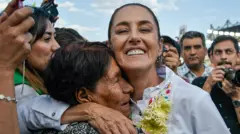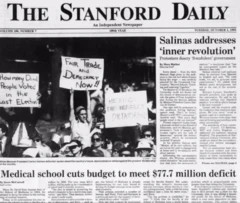Are you curious about the background of Mexico’s leader? At gaymexico.net, we understand the importance of knowing who leads a nation, especially for LGBTQ+ travelers and residents. This article will delve into the president’s origins, covering their background, education, and path to leadership, while considering how these factors shape their approach to issues important to the LGBTQ+ community and Mexico’s broader social landscape. Let’s discuss Mexican politics, leadership origins, and presidential background.
1. Who Is the Current President of Mexico?
The current president of Mexico is Claudia Sheinbaum Pardo. She assumed office on October 1, 2024, marking a historic moment as the first female president of Mexico. Her election signifies a significant shift in Mexican politics, potentially impacting various aspects of the nation, including LGBTQ+ rights and social policies.
1.1. What Is Claudia Sheinbaum’s Background?
Claudia Sheinbaum was born in Mexico City on June 24, 1962. Her parents, Carlos Sheinbaum and Annie Pardo, were both scientists and left-wing activists. Her family background instilled in her a strong sense of social justice and political awareness. According to her biography, she grew up discussing politics at the dinner table and visiting political prisoners with her parents, shaping her early commitment to social activism.
1.2. What Is Sheinbaum’s Educational Background?
Sheinbaum holds a Ph.D. in Energy Engineering from the National Autonomous University of Mexico (UNAM). Her academic work focused on energy efficiency and environmental issues, reflecting her commitment to sustainable development. Her scientific background distinguishes her from many other political leaders and influences her approach to policy-making, emphasizing evidence-based solutions.
Claudia Sheinbaum, a physicist, made history as Mexico’s first female president, bringing a science-based approach to governance.
1.3. What Was Sheinbaum’s Early Career?
Before entering politics, Sheinbaum was a researcher and professor at UNAM. She also contributed to the Intergovernmental Panel on Climate Change (IPCC), which was awarded the Nobel Peace Prize in 2007. Her involvement with the IPCC highlights her dedication to addressing climate change, a critical issue for Mexico and the world.
1.4. How Did Sheinbaum Enter Politics?
Sheinbaum’s political career began in 2000 when she was appointed Secretary of Environment for Mexico City under then-Mayor Andrés Manuel López Obrador (AMLO). In this role, she implemented policies to reduce air pollution and improve urban sustainability. Her success in this position paved the way for her future political endeavors.
2. What Is Sheinbaum’s Political Affiliation and Ideology?
Sheinbaum is a member of the Morena party, founded by AMLO. Her political ideology aligns with left-wing principles, emphasizing social justice, economic equality, and environmental protection. She is considered a close ally of AMLO and a key figure in the “Fourth Transformation” (Cuarta Transformación) movement, which seeks to reshape Mexican society and politics.
2.1. What Is the “Fourth Transformation”?
The Fourth Transformation is a political project initiated by AMLO, aiming to bring profound change to Mexico, similar in scope to the Mexican War of Independence, the Reform War, and the Mexican Revolution. Sheinbaum’s adherence to this movement indicates her commitment to continuing AMLO’s policies and further advancing his vision for the country.
2.2. What Are Sheinbaum’s Key Policy Priorities?
Sheinbaum’s policy priorities include:
- Social Programs: Expanding social welfare programs to reduce poverty and inequality.
- Environmental Sustainability: Promoting renewable energy and addressing climate change.
- Education: Improving access to education and increasing scholarships.
- Gender Equality: Advocating for women’s rights and gender parity.
- Combating Corruption: Continuing efforts to combat corruption and promote transparency.
These priorities reflect her commitment to addressing pressing social and environmental issues in Mexico.
2.3. How Does Sheinbaum’s Ideology Align with LGBTQ+ Rights?
While Sheinbaum has generally supported progressive policies, her stance on LGBTQ+ rights has been somewhat nuanced. As mayor of Mexico City, she oversaw the implementation of various LGBTQ+-friendly policies, including same-sex marriage and gender identity recognition. However, some LGBTQ+ activists have called for stronger action on issues such as discrimination and violence against LGBTQ+ individuals.
2.4. What Challenges Does Sheinbaum Face as President?
As president, Sheinbaum faces numerous challenges, including:
- Security: Addressing high levels of crime and violence, particularly related to drug trafficking.
- Economy: Navigating economic challenges and promoting sustainable growth.
- Inequality: Reducing poverty and inequality, which remain significant issues in Mexico.
- US Relations: Managing the complex relationship with the United States, including issues related to trade, immigration, and security.
- Social Issues: Addressing social issues such as gender-based violence and LGBTQ+ rights.
These challenges require strong leadership and effective policy-making.
 Claudia Sheinbaum
Claudia Sheinbaum
During her campaign, Claudia Sheinbaum presented a more personable image, aiming to connect with voters on a personal level.
3. What Was Sheinbaum’s Political Career Before Becoming President?
Before becoming president, Sheinbaum held several key political positions, including:
- Secretary of Environment of Mexico City (2000-2006): Under Mayor Andrés Manuel López Obrador, she implemented policies to reduce air pollution and improve urban sustainability.
- Mayor of Tlalpan (2015-2017): She served as the mayor of Tlalpan, a borough of Mexico City.
- Mayor of Mexico City (2018-2024): She became the first woman elected as mayor of Mexico City, where she focused on improving public transportation, reducing crime, and promoting environmental sustainability.
3.1. What Were Sheinbaum’s Accomplishments as Mayor of Mexico City?
As mayor of Mexico City, Sheinbaum achieved several notable accomplishments:
- Improved Public Transportation: She invested in expanding and modernizing the city’s metro system and bus network.
- Reduced Crime: She implemented strategies to reduce crime rates, including increasing police presence and improving law enforcement coordination.
- Promoted Environmental Sustainability: She expanded bike lanes, promoted electric vehicles, and implemented policies to reduce greenhouse gas emissions.
- Addressed COVID-19 Pandemic: She led the city’s response to the COVID-19 pandemic, implementing measures to protect public health and support the economy.
These achievements demonstrate her ability to govern effectively and address complex urban challenges.
3.2. What Were the Controversies During Sheinbaum’s Tenure as Mayor?
Despite her accomplishments, Sheinbaum faced several controversies during her tenure as mayor, including:
- 2017 Earthquake: Following the 2017 earthquake, she was criticized for her handling of the collapse of a school in Tlalpan, which resulted in the deaths of 19 children and 7 adults.
- Mexico City Metro Accident: In 2021, a section of the Mexico City Metro collapsed, killing 26 people and injuring dozens more. She faced criticism for the accident and the subsequent investigation.
- Feminist Protests: She faced criticism from feminist activists for her administration’s response to protests against gender-based violence.
These controversies highlight the challenges of governing a large and complex city and the importance of accountability and transparency.
3.3. How Did Sheinbaum Win the Presidential Election?
Sheinbaum won the presidential election in 2024 with a significant margin, defeating her main opponent, Xóchitl Gálvez. Several factors contributed to her victory:
- AMLO’s Endorsement: She received the strong endorsement of AMLO, who remains highly popular in Mexico.
- Morena Party Support: She benefited from the strong support of the Morena party, which has a broad base of support across the country.
- Policy Platform: Her policy platform, which focused on social justice, economic equality, and environmental protection, resonated with many voters.
- Gender: Her candidacy as the first female president of Mexico inspired many voters and helped mobilize support.
These factors combined to propel her to victory in the presidential election.
Claudia Sheinbaum’s early dedication to ballet reflects her disciplined approach and commitment to personal growth.
4. What Can Be Expected from Sheinbaum’s Presidency?
As president, Sheinbaum is expected to continue AMLO’s policies while also pursuing her own agenda. Her presidency is likely to focus on:
- Social Justice: Expanding social programs to reduce poverty and inequality.
- Environmental Sustainability: Promoting renewable energy and addressing climate change.
- Combating Corruption: Continuing efforts to combat corruption and promote transparency.
- Gender Equality: Advocating for women’s rights and gender parity.
- US Relations: Maintaining a pragmatic relationship with the United States while also defending Mexico’s interests.
4.1. How Will Sheinbaum Address LGBTQ+ Rights?
Sheinbaum’s approach to LGBTQ+ rights remains to be seen, but she is expected to continue supporting progressive policies. She may face pressure from LGBTQ+ activists to take stronger action on issues such as discrimination and violence against LGBTQ+ individuals.
4.2. What Is the Political Climate for LGBTQ+ Rights in Mexico?
The political climate for LGBTQ+ rights in Mexico is complex. While same-sex marriage is legal in all states and there have been advances in legal protections, discrimination and violence against LGBTQ+ individuals remain significant problems. According to Human Rights Watch, LGBTQ+ people in Mexico still face significant challenges in accessing healthcare, employment, and other basic rights.
4.3. What Are the Key LGBTQ+ Issues in Mexico?
The key LGBTQ+ issues in Mexico include:
- Discrimination: LGBTQ+ individuals face discrimination in employment, housing, and other areas.
- Violence: LGBTQ+ individuals are often targets of violence, including hate crimes.
- Transgender Rights: Transgender individuals face challenges in obtaining legal recognition of their gender identity and accessing healthcare.
- Adoption Rights: LGBTQ+ couples may face challenges in adopting children.
- Access to Healthcare: LGBTQ+ individuals may face discrimination in healthcare settings and have difficulty accessing appropriate medical care.
Addressing these issues requires comprehensive legal and policy reforms, as well as efforts to promote tolerance and understanding.
4.4. How Can LGBTQ+ Travelers to Mexico Stay Safe?
LGBTQ+ travelers to Mexico can stay safe by:
- Researching Destinations: Researching LGBTQ+-friendly destinations and accommodations.
- Being Aware of Local Laws and Customs: Being aware of local laws and customs regarding LGBTQ+ issues.
- Avoiding Public Displays of Affection: Avoiding public displays of affection in more conservative areas.
- Staying Informed: Staying informed about current events and potential safety risks.
- Using LGBTQ+ Travel Resources: Utilizing LGBTQ+ travel resources and organizations for information and support.
By taking these precautions, LGBTQ+ travelers can have a safe and enjoyable experience in Mexico.
 Portada Standford Daily, 1991, Sheinbaum
Portada Standford Daily, 1991, Sheinbaum
Claudia Sheinbaum’s involvement in protests against neoliberalism during her time at Stanford reflects her ongoing commitment to social justice.
5. What Resources Are Available for LGBTQ+ Individuals in Mexico?
Several resources are available for LGBTQ+ individuals in Mexico:
| Resource | Description |
|---|---|
| Comisión Nacional de los Derechos Humanos | Mexico’s national human rights commission, which investigates and addresses human rights violations. |
| Consejo Nacional para Prevenir la Discriminación (CONAPRED) | The National Council to Prevent Discrimination, which works to combat discrimination against marginalized groups. |
| LGBTQ+ Organizations | Numerous LGBTQ+ organizations throughout Mexico offer support, advocacy, and resources. |
These resources can provide valuable support and assistance to LGBTQ+ individuals in Mexico.
6. What Is gaymexico.net’s Role in Providing Information and Support?
Gaymexico.net is dedicated to providing comprehensive and up-to-date information for the LGBTQ+ community interested in Mexico. Our website offers:
- Travel Guides: Detailed travel guides to LGBTQ+-friendly destinations in Mexico.
- Event Listings: Listings of LGBTQ+ events, festivals, and celebrations.
- News and Information: News and information on LGBTQ+ issues in Mexico.
- Community Resources: A directory of LGBTQ+ organizations and resources.
- Personal Stories: Personal stories and experiences from LGBTQ+ individuals in Mexico.
We strive to be a trusted source of information and a valuable resource for the LGBTQ+ community.
7. What Are Some LGBTQ+-Friendly Destinations in Mexico?
Mexico offers several LGBTQ+-friendly destinations, including:
- Puerto Vallarta: Known as one of the most LGBTQ+-friendly cities in the world, with a vibrant gay scene and welcoming atmosphere.
- Mexico City: The capital city offers a diverse LGBTQ+ scene, with numerous gay bars, clubs, and cultural events.
- Cancun: A popular tourist destination with a growing LGBTQ+ scene and several gay-friendly resorts and hotels.
- Guadalajara: Mexico’s second-largest city, with a rich cultural history and a thriving LGBTQ+ community.
- Tulum: A beautiful beach town on the Yucatán Peninsula, known for its relaxed atmosphere and LGBTQ+-friendly accommodations.
These destinations offer a welcoming and inclusive environment for LGBTQ+ travelers.
8. How Can I Stay Updated on LGBTQ+ Issues in Mexico?
You can stay updated on LGBTQ+ issues in Mexico by:
- Following LGBTQ+ News Outlets: Following LGBTQ+ news outlets and organizations for the latest updates.
- Subscribing to Newsletters: Subscribing to newsletters from LGBTQ+ organizations and travel resources.
- Using Social Media: Following LGBTQ+ activists and organizations on social media.
- Checking gaymexico.net: Regularly checking gaymexico.net for news, information, and resources.
By staying informed, you can be an ally to the LGBTQ+ community and support their rights.
9. What Are the Potential Impacts of Sheinbaum’s Presidency on LGBTQ+ Rights?
Sheinbaum’s presidency has the potential to significantly impact LGBTQ+ rights in Mexico. Depending on her policies and priorities, she could:
- Advance Legal Protections: Support legislation to strengthen legal protections for LGBTQ+ individuals.
- Promote Equality: Implement policies to promote equality and reduce discrimination.
- Increase Awareness: Raise awareness of LGBTQ+ issues and promote tolerance and understanding.
- Allocate Resources: Allocate resources to support LGBTQ+ organizations and initiatives.
However, it is also possible that progress on LGBTQ+ rights could stall or even regress under her presidency, depending on political pressures and priorities.
10. How Can I Get Involved in Supporting LGBTQ+ Rights in Mexico?
You can get involved in supporting LGBTQ+ rights in Mexico by:
- Donating to LGBTQ+ Organizations: Donating to LGBTQ+ organizations that work to advance LGBTQ+ rights.
- Volunteering: Volunteering your time and skills to support LGBTQ+ initiatives.
- Advocating for Change: Contacting your elected officials and advocating for policies that support LGBTQ+ rights.
- Educating Others: Educating others about LGBTQ+ issues and promoting tolerance and understanding.
- Supporting LGBTQ+-Owned Businesses: Supporting LGBTQ+-owned businesses and organizations.
By getting involved, you can make a difference in the lives of LGBTQ+ individuals in Mexico.
Claudia Sheinbaum and AMLO during an event, highlighting their political alignment and shared vision for Mexico’s future.
FAQ: Unveiling the President of Mexico’s Background
1. Where was Claudia Sheinbaum born?
Claudia Sheinbaum was born in Mexico City, Mexico, on June 24, 1962, rooting her deeply in the nation’s capital and its political landscape. This local connection has influenced her policies and understanding of urban challenges.
2. What is Claudia Sheinbaum’s educational background?
She holds a Ph.D. in Energy Engineering from the National Autonomous University of Mexico (UNAM), showcasing her academic prowess and commitment to sustainable energy solutions. Her scientific background informs her data-driven approach to governance.
3. What political party does Claudia Sheinbaum belong to?
Claudia Sheinbaum is a member of the Morena party, founded by Andrés Manuel López Obrador, aligning her with a left-leaning political ideology. This affiliation shapes her policies and priorities, often focusing on social justice and equality.
4. What were some of Claudia Sheinbaum’s key accomplishments as Mayor of Mexico City?
She improved public transportation, reduced crime rates, and promoted environmental sustainability, demonstrating her leadership and ability to tackle urban challenges. These achievements have solidified her reputation as an effective and forward-thinking leader.
5. How has Claudia Sheinbaum addressed LGBTQ+ rights in her political career?
She has generally supported progressive policies, including same-sex marriage and gender identity recognition in Mexico City, though some activists seek stronger action. Her nuanced stance reflects the complexities of LGBTQ+ rights in Mexico’s diverse society.
6. What are some of the main challenges facing Claudia Sheinbaum as President of Mexico?
She faces challenges such as high crime rates, economic inequality, and managing relations with the United States, requiring strategic and decisive leadership. These issues demand comprehensive solutions and a steady hand at the helm.
7. What is the “Fourth Transformation” that Claudia Sheinbaum aligns with?
It is a political project initiated by AMLO to bring profound change to Mexico, similar to the country’s major historical transformations, signifying a deep commitment to reshaping Mexican society. Sheinbaum’s dedication to this movement underscores her vision for a more equitable and just Mexico.
8. What is the significance of Claudia Sheinbaum being the first female president of Mexico?
Her election represents a historic milestone, symbolizing progress towards gender equality and potentially influencing policies related to women’s rights. This achievement breaks barriers and inspires future generations of female leaders in Mexico and beyond.
9. How can LGBTQ+ travelers stay safe while visiting Mexico?
Researching LGBTQ+-friendly destinations, being aware of local laws, and utilizing LGBTQ+ travel resources are key for a safe and enjoyable trip. These precautions help ensure a positive and welcoming experience in Mexico’s diverse cultural landscape.
10. What resources are available for LGBTQ+ individuals in Mexico?
Various LGBTQ+ organizations, human rights commissions, and anti-discrimination councils offer support, advocacy, and resources, providing essential assistance to the LGBTQ+ community in Mexico. These networks help foster a sense of community and promote equality and inclusion.
We at gaymexico.net invite you to explore our website for more detailed travel guides, event listings, and community resources tailored for LGBTQ+ individuals interested in Mexico. Discover LGBTQ+-friendly hotels, bars, events, and personal stories that will make your travel or relocation experience safer and more enjoyable. Whether you’re planning a visit or looking to connect with the LGBTQ+ community in Mexico, we’re here to provide the information and support you need. Contact us at Address: 3255 Wilshire Blvd, Los Angeles, CA 90010, United States. Phone: +1 (213) 380-2177. Let gaymexico.net be your companion in discovering all that Mexico has to offer.
